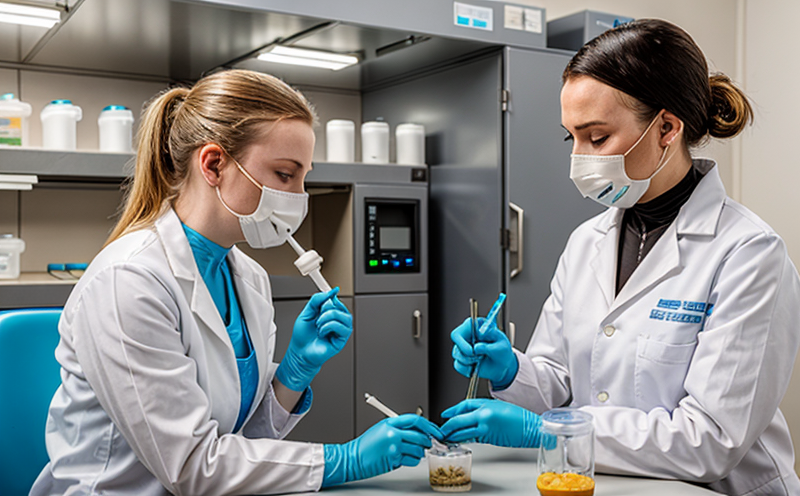ASTM D5473 Aflatoxin Residue Profiling in Corn
The ASTM D5473 standard is a widely recognized protocol designed to ensure the safety of corn products by quantifying aflatoxin residues. This method uses liquid chromatography coupled with tandem mass spectrometry (LC/MS-MS) to achieve high sensitivity and specificity in detecting aflatoxins, which are potent carcinogens produced by certain molds such as Afrotoxigenic and Paecilomyces. Corn is particularly vulnerable to contamination due to its growing conditions and post-harvest handling. Ensuring compliance with this standard is crucial for maintaining the integrity of corn products in both domestic and international markets.
The testing process begins with a comprehensive sample preparation procedure that includes extraction, concentration, clean-up steps, and derivatization if necessary. This ensures that only pure aflatoxin molecules are introduced into the analytical system, reducing matrix interference and enhancing detection sensitivity. The choice of extraction solvents and clean-up columns is critical for accurate results.
The instrumentation used in ASTM D5473 testing typically includes a high-performance liquid chromatograph (HPLC) equipped with an ultraviolet-visible detector (UV-Vis) or photodiode array detector (PDA), followed by a tandem mass spectrometer (MS/MS). This setup allows for precise identification and quantification of aflatoxins based on their unique fragmentation patterns. The method’s lower limit of detection is typically around 0.1 ppb, making it suitable for detecting even trace amounts of these harmful compounds.
Results are reported in terms of total aflatoxin content (B1, B2, G1, and G2) as well as any additional variants detected. Compliance with this standard helps manufacturers meet regulatory requirements set by various countries including the United States, Europe, China, and others who have adopted this or similar standards.
Quality managers and compliance officers responsible for food safety should prioritize ASTM D5473 testing to protect public health. By adhering to this protocol, they can ensure that corn products meet strict safety thresholds and maintain consumer trust. R&D engineers benefit from accurate data provided by this method to optimize production processes and develop safer product lines.
For procurement teams dealing with global sourcing of raw materials, ensuring conformity to ASTM D5473 is essential for avoiding contaminated batches that could compromise end-product quality or lead to costly recalls.
- International Acceptance: ASTM D5473 has gained widespread acceptance in the food and feed industries globally. It is widely recognized by regulatory bodies such as the U.S. Food and Drug Administration (FDA), European Commission, and various national standards organizations. Compliance with this standard ensures that corn products meet stringent safety criteria set forth by international markets.
Eurolab Advantages
As a leading independent laboratory, Eurolab offers several key advantages when it comes to ASTM D5473 testing for aflatoxin residues in corn. Our state-of-the-art facilities are equipped with the latest LC/MS-MS instrumentation, providing high accuracy and precision in our results.
We employ highly skilled scientists who possess extensive experience in food safety analysis, ensuring that every sample undergoes rigorous examination under controlled conditions. The use of advanced technology enables us to provide rapid turnaround times without compromising on quality assurance measures.
Our commitment to compliance extends beyond just performing tests; we also offer training sessions and guidelines tailored specifically for our clients' needs. This includes workshops on proper sampling techniques, interpretation of results, and best practices for maintaining product safety throughout the supply chain.
In addition, Eurolab adheres strictly to international standards such as ASTM D5473, ISO 17025, and other relevant regulations governing laboratory operations. Our certifications demonstrate our reliability and competence in delivering accurate analytical services consistently across different projects.
Competitive Advantage and Market Impact
Adopting ASTM D5473 testing for aflatoxin residues in corn can give businesses a significant competitive edge by ensuring product safety and meeting stringent regulatory requirements. This not only enhances brand reputation but also reduces the risk of recalls and legal issues associated with contaminated products.
Compliance with international standards like ASTM D5473 demonstrates a company’s commitment to maintaining high ethical standards in sourcing and manufacturing processes. Such adherence builds trust among consumers, retailers, distributors, and other stakeholders within the supply chain.
Furthermore, by consistently meeting these safety benchmarks, companies can open doors to new markets where strict regulatory compliance is mandatory. This opens up opportunities for expansion into regions such as Asia-Pacific or Middle East-North Africa where demand for safe corn products continues to grow rapidly.





